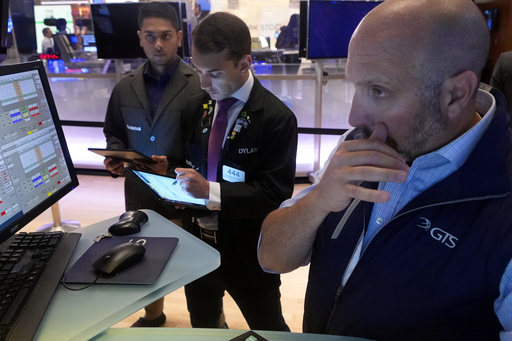Markets around the world, including Wall Street, are experiencing a wave of unease recently. This concern stems from fears about a slowing U.S. economy, leading to significant drops in the Japanese market and substantial losses in market value for prominent technology companies globally. This shift has disrupted what had been a relatively stable year for markets.
For a large portion of the year, investors worldwide were driving stock markets up, believing that central banks were making progress in controlling inflation while being supported by a robust U.S. economy and the excitement surrounding artificial intelligence. By June, Nvidia, a leading AI chipmaker, had joined the ranks of $3 trillion companies alongside Apple and Microsoft. In mid-July, record highs were reached by the S&P 500, Nasdaq composite, and Japan’s Nikkei 225, with investors optimistic about the impact of high-interest rates set by the U.S. Federal Reserve in curbing inflation without severely slowing down the U.S. economy.
However, confidence has taken a hit in recent days. Investors are heeding warnings about the overvaluation of Big Tech stocks like Nvidia and concerns that heavy spending on AI may not translate into profits in the near term. Weak data on the job market, manufacturing, and construction sparked concerns about a potential U.S. recession, coupled with criticisms that the Fed delayed rate cuts. The Bank of Japan’s decision to raise rates further added to the turmoil in Japan’s markets.
On Friday, the Nasdaq composite entered a correction territory, dropping by 10% from its recent peak. The Nikkei experienced its most significant decline since 1987, plunging over 12% on Monday. By midday in the U.S., the S&P 500 was down by 2.2%, and the Dow Jones Industrial Average had fallen by 2%. Economic uncertainties led to decreases in oil and commodity prices.
Market participants in the U.S. are now speculating that the Federal Reserve might need to implement a half-percentage-point rate cut in September, straying from the typical quarter-point adjustments. There are even calls for an emergency rate cut. However, some voices argue that the sell-off could be beneficial as stock prices had escalated to unsustainable levels.
Several factors are fueling the market turbulence, including concerns about inflation and central bank policies. While the Fed has not raised its benchmark rate for a year, interest rates remain relatively high after a series of increases initiated in 2022. Investors had been optimistic about central banks’ efforts to rein in inflation, but recent data showing inflation above target levels raised uncertainties. Anxiety over the U.S. economy has also intensified, exacerbated by weak economic reports last week, including a notable slowdown in hiring.
Moreover, a notable sector experiencing challenges is Big Tech, particularly the “Magnificent Seven” influential stocks. These tech giants had propelled the market to numerous record highs this year, driven by excitement over AI technology. However, concerns over lofty valuations and the difficulty of meeting profit expectations, especially in the AI realm, have dampened investors’ enthusiasm. The recent underwhelming earnings reports from these tech companies have led to significant stock price corrections.
Japan’s market has not been spared, with the Nikkei enduring its steepest two-day decline in history, plummeting by 18.2% in recent trading sessions. The selling pressure affected various firms, including Toyota, Honda, and Tokyo Electron. The Bank of Japan’s decision to raise interest rates contributed to the decline, with carry trades playing a role. These trades involve borrowing from countries with low-interest rates and weak currencies, such as Japan, to invest in higher-yielding assets. However, the yen’s appreciation and higher interest rates have forced investors to sell stocks to repay loans, further impacting the market.


